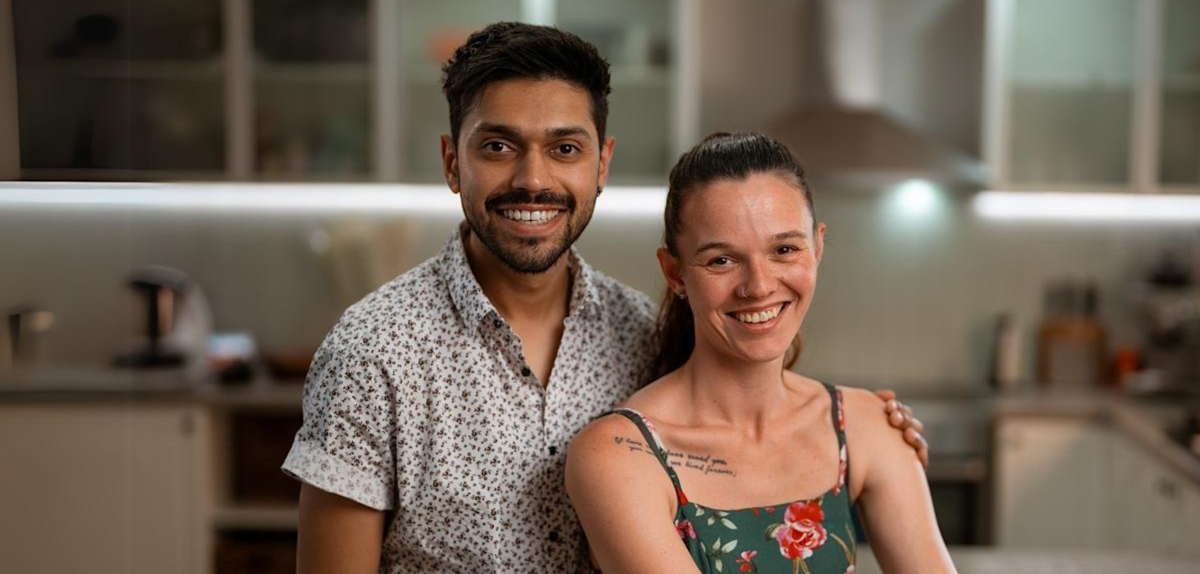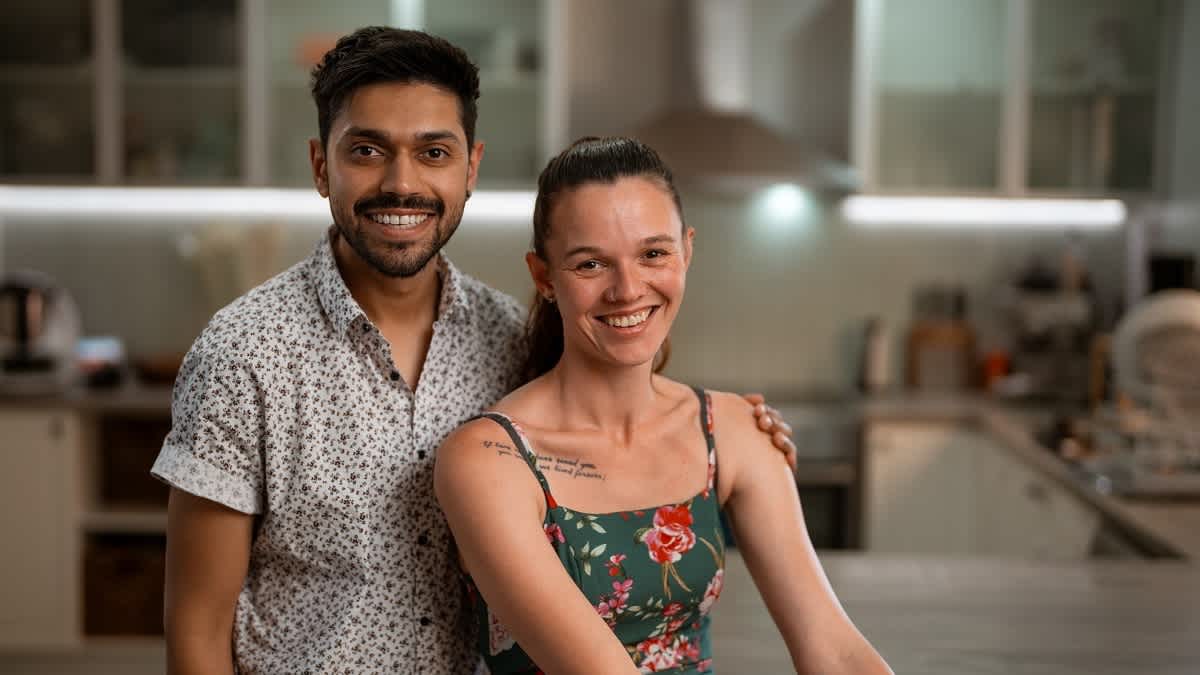
Meet Tahnee and Shailen
Tahnee and Shailen were so inspired by their friends who were foster carers that the couple, who had no children of their own at the time, decided to apply to become foster carers in Queensland too. Now, they have been foster carers for seven years and said they don't plan on stopping any time soon.
Tahnee and Shailen sat down to answer questions about their fostering experience and share the wonderful impact it has had on them.

Image: Shailen and Tahnee stand together in a kitchen, smiling at the camera.
What made you decide to become foster carers?
After growing up with her mum regularly welcoming in the neighbourhood kids, and being an aunty to five by the time she was an adult, Tahnee said it felt like fostering was her destiny all along.
“And my husband’s along for the ride,” she joked, adding “he loves it as well.”
“Fostering has definitely changed my life,” said Shailen.
“Having that level of responsibility actually helps you grow as a person.”
What type of care do you provide?
Tahnee and Shailen started as kinship carers, and their love of taking care of young people only grew from there.
“We’ve had a range of different care types, from respite to emergency placements and longer-term placements,” Shailen said.
“Our family is currently made up of our two children and three children in our care.”
How do you prepare to be a foster parent?
Tahnee recalled when their first foster child, a baby, was brought to their home, she had a little panic over the enormity of the situation. Her biggest concern was whether she would wake up to the baby as it cried during the night, but said caring for him just came naturally.
The couple said it is important to know what you can take on as a family.
“You need to make sure that you are comfortable,” Shailen said.
“Before having a child trusted in your care, there is a significant amount of support and training provided,” Shailen said.
“It goes through all sorts of things like teaching you different parenting tactics and making you aware of how you need to care for children who may be suffering from trauma."
“We have a really good support network around us,” he added.
“We’ve got my wife’s family, my family, and we’ve also got a lot of friends who are really supportive and able to help out if we need.”
What support do you receive from Life Without Barriers?
“Anything I need,” said Tahnee.
“Whether I call after hours, saying, ‘Hey, this happened, what should I do?’ They always pick up or they’ll send a message saying, ‘Can I call you back?’”
“We’ve had our needs met over and above what you would expect.”
Is there a special way that you prepare to welcome a child or young person to your home?
When welcoming a child into their home for the first time, the couple helps the young person familiarise themselves with the house and toys, ensuring they feel safe in the space.
“Anything we can do to ease the transition and provide creature comforts,” said Shailen.
How have you overcome challenges while being a foster carer?
Tahnee and Shailen are careful to apply a consistent standard of parenting with all the children in the home to promote positive behaviours.
“I don’t have any special talents, just a little bit of patience,” said Tahnee.
“When you do help children to overcome a certain challenging aspect of their life, it is really rewarding to be a part of that.”
What experience have you had in caring for a child with complex needs?
Tahnee and Shailen also provide care to a child with disability and emergency care for children with medical needs.
With a little community of foster carer friends, some who also care for children with disability, the couple find they can lean on the group’s collective experience for additional support.
“She’s defied a lot of odds. And it’s been a lot of teamwork to get her to where she is today,” said Tahnee.
How do you feel about the prospect of reunification for the child in your care?
“Watching kids interact with their families and still being able to maintain that relationship and that bond and being part of seeing them interact with family is really important,” said Tahnee.
“Reunification is the primary goal of fostering,” Shailen explained.
“We go into it knowing that at the end of the day – we’re all human – there will be attachments formed. But if you take that step back and really think about what’s in the best interest of the child, you manage to process that.”
Tahnee agreed, sharing that she finds it easy because it’s so rewarding to see the progress the child makes after working so closely with a family, and the progress the parents make so it is possible for the child to return home.
“We’ve watched some kids grow up, and to just be like, oh my god, I was a part of that, and now you’re back home, you’re happy, you’re healthy, you’re thriving. It’s really good to see.”
Was foster care the right decision for you?
“I would take on a million children, but I’m not allowed,” joked Tahnee.
“I thoroughly enjoy being a foster carer. If I could stay at home and take in ten more children, whether it be for emergencies, or for a short amount of time, I would.”
Shailen said the thing he loves most about fostering is the positive impact he has on a child’s life – no matter how small it is.
“It is rewarding to have that positive impact, even if it's for a really short time,” said Shailen.
“The plan is to continue to change the lives of children and support parents with reunification,” said Tahnee.
“Even if we are a bed for a night or a meal for a night, then that's fine by me.”
“Whether you can only care for one child or you can care for ten children, you're going to make one child's life different,” added Tahnee.
“And if you can change the life of one child, it's worth it.”
Story adapted from the Queensland Government’s Department of Child, Youth Justice, and Multicultural Affairs Carer Recruitment campaign.
Got more questions?
Our friendly and helpful fostering specialists are ready to answer your questions. Whether you're looking to start the process, get some answers or want more information, our team is waiting for you to connect.